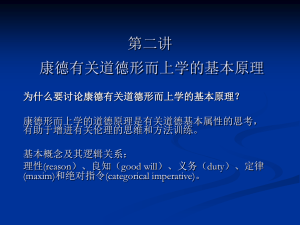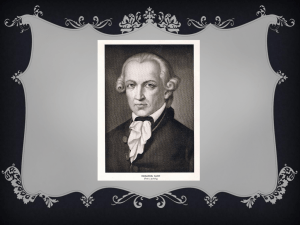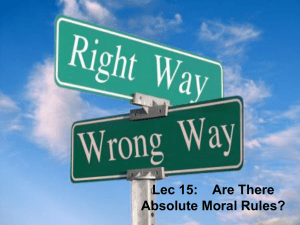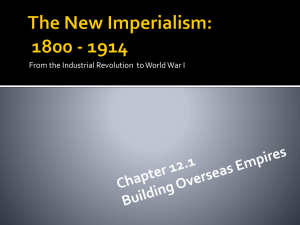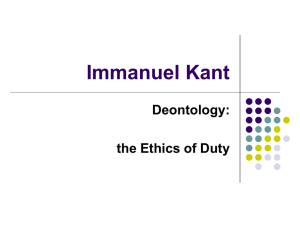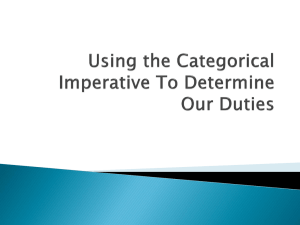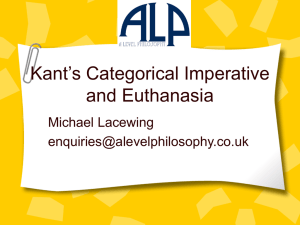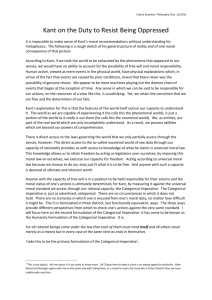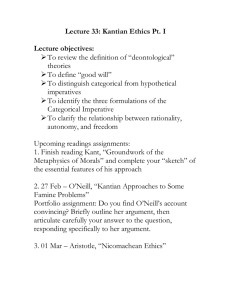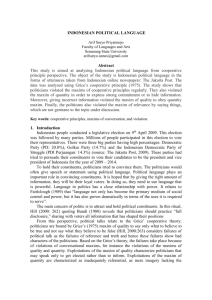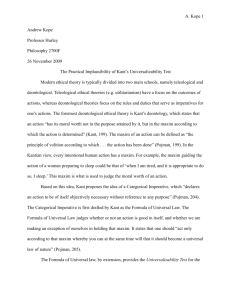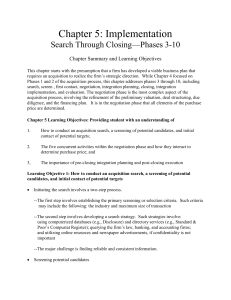Immanuel Kant
advertisement
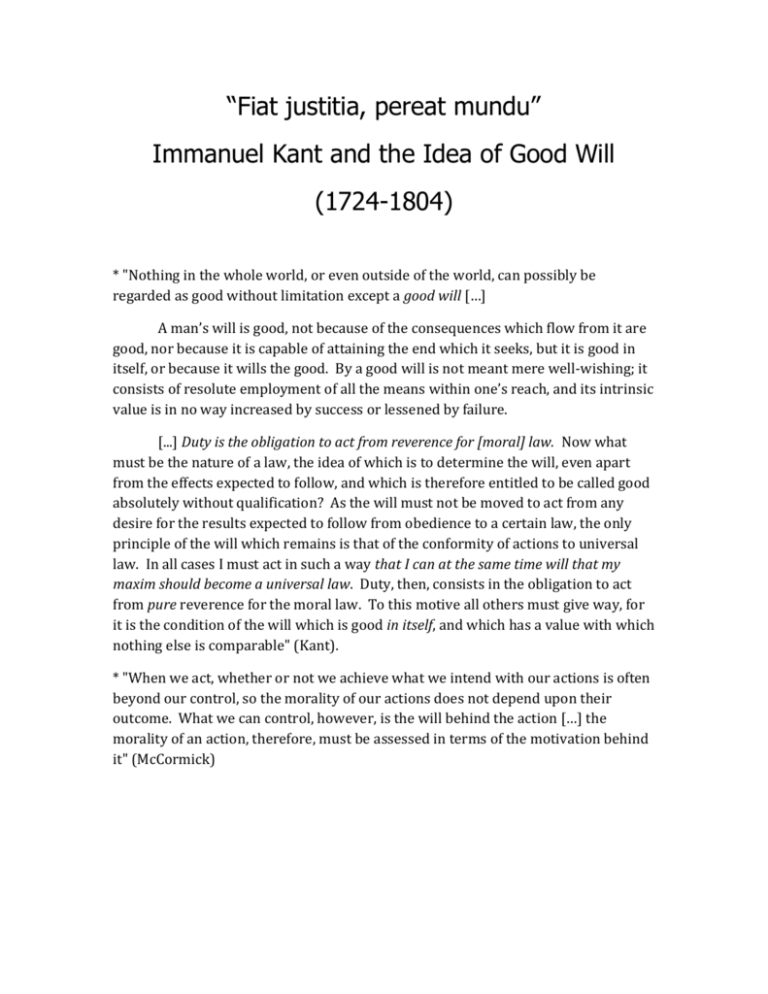
“Fiat justitia, pereat mundu” Immanuel Kant and the Idea of Good Will (1724-1804) * "Nothing in the whole world, or even outside of the world, can possibly be regarded as good without limitation except a good will […] A man’s will is good, not because of the consequences which flow from it are good, nor because it is capable of attaining the end which it seeks, but it is good in itself, or because it wills the good. By a good will is not meant mere well-wishing; it consists of resolute employment of all the means within one’s reach, and its intrinsic value is in no way increased by success or lessened by failure. [...] Duty is the obligation to act from reverence for [moral] law. Now what must be the nature of a law, the idea of which is to determine the will, even apart from the effects expected to follow, and which is therefore entitled to be called good absolutely without qualification? As the will must not be moved to act from any desire for the results expected to follow from obedience to a certain law, the only principle of the will which remains is that of the conformity of actions to universal law. In all cases I must act in such a way that I can at the same time will that my maxim should become a universal law. Duty, then, consists in the obligation to act from pure reverence for the moral law. To this motive all others must give way, for it is the condition of the will which is good in itself, and which has a value with which nothing else is comparable" (Kant). * "When we act, whether or not we achieve what we intend with our actions is often beyond our control, so the morality of our actions does not depend upon their outcome. What we can control, however, is the will behind the action […] the morality of an action, therefore, must be assessed in terms of the motivation behind it" (McCormick) The universalisability test has five steps: 1. 2. 3. 4. 5. Find the agent's maxim (i.e., an action paired with its motivation). Take for example the declaration "I will lie for personal benefit". Lying is the action; the motivation is to fulfill some sort of desire. Paired together, they form the maxim. Imagine a possible world in which everyone in a similar position to the real-world agent followed that maxim. With no exception of one's self. This is in order for you to hold people to the same principle that is required of yourself. Decide whether any contradictions or irrationalities arise in the possible world as a result of following the maxim. If a contradiction or irrationality arises, acting on that maxim is not allowed in the real world. If there is no contradiction, then acting on that maxim is permissible, and sometimes required even though it may go against your best interests. Universalizability Worksheet Test LOTTERY TEST STEP ONE: Find the maxim STEP TWO: Imagine a world where everyone follows that maxim STEP THREE: Discuss any possible contradictions or problems to a world in which everyone follows that maxim. STEP FOUR: Is the maxim allowable? STEP FIVE: If the maxim is allowable what might be some tough situations when you will have to follow it even though it may cause you some pain? Relative vs. universal Deontology – judges the morality of an action based on the action’s adherence to a rule or rules. Immanuel Kant (German pronunciation: [ɪˈmaːnu̯eːl ˈkant]; 22 April 1724 – 12 February 1804) was a German philosopher from Königsberg (today Kaliningrad of Russia), researching, lecturing and writing on philosophy and anthropology at the end of the 18th century Enlightenment.[1] Kant is known for his theory that there is a single moral obligation, which he called the "Categorical Imperative", and is derived from the concept of duty. Kant defines the demands of the moral law as "categorical imperatives". Categorical imperatives are principles that are intrinsically valid; they are good in and of themselves; they must be obeyed in all, and by all, situations and circumstances if our behavior is to observe the moral law. It is from the Categorical Imperative that all other moral obligations are generated, and by which all moral obligations can be tested. Kant also stated that the moral means and ends can be applied to the categorical imperative, that rational beings can pursue certain "ends" using the appropriate "means". Ends that are based on physical needs or wants will always give merely hypothetical imperatives. The categorical imperative, however, may be based only on something that is an "end in itself". That is, an end that is a means only to itself and not to some other need, desire, or purpose.[38] He believed that the moral law is a principle of reason itself, and is not based on contingent facts about the world, such as what would make us happy, but to act upon the moral law which has no other motive than "worthiness of being happy".[39] Accordingly, he believed that moral obligation applies only to rational agents.[40] A categorical imperative is an unconditional obligation; that is, it has the force of an obligation regardless of our will or desires (Contrast this with hypothetical imperative)[41] In Groundwork of the Metaphysic of Morals (1785) Kant enumerated three formulations of the categorical imperative which he believed to be roughly equivalent.[42] Kant believed that if an action is not done with the motive of duty, then it is without moral value. He thought that every action should have pure intention behind it; otherwise it was meaningless. He did not necessarily believe that the final result was the most important aspect of an action, but that how the person felt while carrying out the action was the time at which value was set to the result. In Groundwork of the Metaphysic of Morals, Kant also posited the "counter-utilitarian idea that there is a difference between preferences and values and that considerations of individual rights temper calculations of aggregate utility", a concept that is an axiom in economics:[43] Everything has either a price or a dignity. Whatever has a price can be replaced by something else as its equivalent; on the other hand, whatever is above all price, and therefore admits of no equivalent, has a dignity. But that which constitutes the condition under which alone something can be an end in itself does not have mere relative worth, i.e., price, but an intrinsic worth, i.e., a dignity. (p. 53, italics in original). A phrase quoted by Kant, which is used to summarize the counterutilitarian nature of his moral philosophy, is Fiat justitia, pereat mundus, ("Let justice be done, though the world perish"), which he translates loosely as "Let justice reign even if all the rascals in the world should perish from it". This appears in his 1795 Perpetual Peace (Zum ewigen Frieden. Ein philosophischer Entwurf.), Appendix 1.[44][45][46] [edit] The first formulation The first formulation (Formula of Universal Law) of the moral imperative "requires that the maxims be chosen as though they should hold as universal laws of nature" .[42] This formulation in principle has as its supreme law the creed "Always act according to that maxim whose universality as a law you can at the same time will" and is the "only condition under which a will can never come into conflict with itself [....]"[47] One interpretation of the first formulation is called the "universalizability test".[48] An agent's maxim, according to Kant, is his "subjective principle of human actions": that is, what the agent believes is his reason to act.[49] The universalisability test has five steps: 6.Find the agent's maxim (i.e., an action paired with its motivation). Take for example the declaration "I will lie for personal benefit". Lying is the action; the motivation is to fulfill some sort of desire. Paired together, they form the maxim. 7.Imagine a possible world in which everyone in a similar position to the real-world agent followed that maxim. With no exception of one's self. This is in order for you to hold people to the same principle that is required of yourself. 8.Decide whether any contradictions or irrationalities arise in the possible world as a result of following the maxim. 9.If a contradiction or irrationality arises, acting on that maxim is not allowed in the real world. 10. If there is no contradiction, then acting on that maxim is permissible, and is sometimes required. (For a modern parallel, see John Rawls' hypothetical situation, the original position.) [edit] The second formulation The second formulation (or Formula of the End in Itself) holds that "the rational being, as by its nature an end and thus as an end in itself, must serve in every maxim as the condition restricting all merely relative and arbitrary ends".[42] The principle dictates that you "[a]ct with reference to every rational being (whether yourself or another) so that it is an end in itself in your maxim", meaning that the rational being is "the basis of all maxims of action" and "must be treated never as a mere means but as the supreme limiting condition in the use of all means, i.e., as an end at the same time".[50] [edit] The third formulation The third formulation (Formula of Autonomy) is a synthesis of the first two and is the basis for the "complete determination of all maxims". It says "that all maxims which stem from autonomous legislation ought to harmonize with a possible realm of ends as with a realm of nature".[42] In principle, "So act as if your maxims should serve at the same time as the universal law (of all rational beings)", meaning that we should so act that we may think of ourselves as "a member in the universal realm of ends", legislating universal laws through our maxims (that is, a code of conduct), in a "possible realm of ends".[51] None may elevate themselves above the universal law, therefore it is one's duty to follow the maxim(s).
